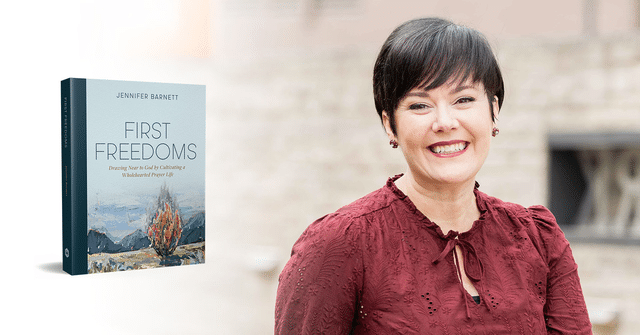Listen to the original audio recording via the player above. Also available on Spotify, Google, and Apple.
The Book in Three Sentences
Jennifer Barnett writes First Freedoms to help you draw close to God through a wholehearted prayer life. Because of sin, guilt, shame, unforgiveness, wounds, ungodly beliefs, entanglements, and the Enemy, we all experience distance from God. In First Freedoms, Jennifer gives you tools to overcome all of these in Christ and draw nearer and nearer to God.
Full Review (Adapted from Video Review)
I’m Chad Harrington from HIM Publications, and I’m reviewing Jennifer Barnett’s book First Freedoms. By the end of this blog, you’ll know what the main message is, my perspective on it, and why you might want to use this book for discipleship group material.
First, my three biggest takeaways from the book.
1. We all face legitimate challenges in prayer.
Christians always talk about how they want to read the Bible and pray more. We ask our fellow Christians to pray for us about this all the time because it’s hard to read the Bible and pray more.
Jennifer Barnett addresses this struggle in her book. She says that sin, guilt, shame, unforgiveness, wounds, ungodly beliefs, entanglements, and the Enemy can all cause us to experience distance from God. Through her work through Freedom Prayer she’s compiled best practices to help people overcome each one of these and to cultivate a deep prayer life with God.
That’s what the book First Freedoms is all about.
2. We all need help in learning how to pray.
Jennifer Barnett intended for First Freedoms to be used by church discipleship groups so they can start experiencing more freedom in prayer. The problem in our prayer lives is we hit spiritual walls, and we need help working through those barriers.
There are 17 chapters, and Jennifer goes through three main sections in the book: “The Connection” with the Father; “The Core” issues to work through; and “The Culmination” of this wholehearted prayer life we seek.
As the publisher for this book, I’ve learned that churches use the book in various ways. People sometimes go through just one part of the book. For example, they might study the seven “Core” chapters to work through each barrier we face in our prayer lives head on; they can go through the first five chapters about the “Connection” with our Father; or they’ll go through other combinations of chapters.
This is written for both men and women to use, so it’s perfect for any discipleship group context—men only, women only, or mixed gender.
We all need help learning to pray, and this book gives us tools to do that.
3. We long to draw near to God.
As I mentioned, First Freedoms is written for both men and women, but I love how Jennifer brings a female touch to conversations around prayer. One of my favorite stories in the book, as an example, continues to come back to my mind about drawing near to the Father:
Jennifer and her husband had adopted a little girl from China. Once they brought her home, they immediately treated her as their daughter, but she didn’t always accept that.
So every Friday they would have movie night with pizza and cookies. They would spread the pizza and cookies on the rug and just eat on the floor and watch the movie. Their daughter would come to the edge of the rug, but she wouldn’t come all the way near to them—she wouldn’t even touch the rug. She might take a bite of food and watch the movie, but she always kept some distance from the family. Jennifer never forced her.
“Then one Friday evening, without any special prompting,” she writes, her daughter “willingly crawled up in [her] lap and stayed there.” Jennifer says, “And I’m thankful to say that she has stayed near ever since” (page 62).
Just as a child longs for their mother, we long for nearness with God, and God longs for that nearness too. He’s waiting.
My Bottom-Line Opinion About First Freedoms
I highly recommend this book for groups who want to grow in their prayer lives. There are both personal reflection questions and group discussion questions included in the book for each chapter, so it’s perfect for group discussions. Plus, there’s even some workbook questions and exercises included as part of the personal reflection time.
What can this book accomplish for the group?
This book:
- Introduces your group to areas of prayer that have likely been neglected
- Opens up hearts to God’s love and his desire to be close to us
- Helps people see their specific barriers in prayer
- Provides practical tools for growing in prayer
- Gives us a reminder of the effects of the unseen, spiritual realm on us in prayer
Connect with Freedom Prayer Ministries
Connect with Jennifer Barnett’s ministry, Freedom Prayer, here. They are dedicated to helping churches develop prayer teams.
Using First Freedoms in a Group Context

Vital Information about First Freedoms
- Chapter Count? 17 chapters
- Weeks of Study? 5–18 weeks (You could do as few as 5 weeks and as many as 18.)
- Recommended size of group? 3–12 people
- Age of target audience? Adult
- Gender specific? No
- Reader difficulty? 4 out of 10
- Appropriate for New Believers? Yes
Housekeeping on First Freedoms
- Discussion questions in the book? Yes
- Homework required? Yes
- Video series available? No
Theology of First Freedoms
- Theological red flags? No
- Denominationally specific content? No
- Author’s preferred Bible translation? NIV
- Publisher? Nashville: HIM Publications, 2021
Recommended Purchase Links
Keep this tool free by using our affiliate links!
What level of maturity does this assume?
This book assumes that the reader is a believer who wants to grow in prayer. Believers of all levels of maturity could read this, assuming they have that desire. So if part of your group’s immaturity is a lack of a desire to pray or grow, this book may not be for you. Most people who read this book will find gems of insight.
My Favorite Quotes from First Freedoms
Read below my favorite quotes from First Freedoms by Jennifer Barnett. Page numbers are included in parentheses.
- “It takes time and practice to learn to discern the voice of God.” (p. 16)
- “Prayer is a primary means of God’s grace to help us encounter the Lord.” (p. 22)
- “God is not a passive participant in prayer.” (p. 41)
- “His heart beats for communion with you.” (p. 50)
- “God created us to think about the ones we love, and to do so constantly.” (p. 55)
- “The Father meets us in our seeking.” (p. 64)
- “We can partake of Sabbath rest constantly through close proximity with the Father.” (p. 66)
- “The Father placed our longing for nearness in us from the beginning.” (p. 66)
- “The common yet lavish grace of God is available to all of us.” (p. 75)
- “Abiding is the antidote to the unsatisfied Christian life.” (p. 75)
- “God’s table is not designed for quick visits but for long stays. We were made to linger.” (p. 76)
“The property of our heart belongs to Jesus.” (p. 85)
- “Our heart has to buy into the idea of forgiveness to get freedom.” (p. 94)
- “A lot of the trash that causes our false beliefs is often thrown there by other people.” (p. 110)
- “For every problem caused by untruth, the solution is nearness to God.” (p. 112)
- “On the shoulders of the shepherd, the sheep now has the shepherd’s vantage point.” (p. 122)
- “When we turn from sin and acknowledge the wrong, we are met with mercy.” (p. 135)
- “When we remove our role in spiritual warfare, we remove our power.” (p. 143)
- “Be mindful of warfare following a new position, promotion, or transition in your life.” (p. 145)
- “God’s timing is perfect.” (p. 146)
- “Our intimacy with God is crucial for spiritual warfare.” (p. 154)
- “The last place the devil wants to reside is near the praises of God’s people.” (p. 157)
- “You are a holy racer with a holy garment.” (p. 168)
- “We cannot hold a candle, even with the most radiant crown, to the One arrayed in splendor.” (p. 176)
- “When we carry any degree of holy authority, people will recognize it because it is otherworldly.” (p. 186)
- “God has a way of bringing holiness to a mess.” (p. 188)
- “Jesus’ suffering benefitted the masses, and our suffering can benefit others too.” (p. 199)
- “Followers of Jesus can’t display God’s glory when their sin, entanglements, wounds, and ungodly beliefs override the landscape of their hearts.” (p. 207)
- “We were made to be image bearers and glory reflectors.” (p. 211)
- “The most peaceful place for us is close to God.” (p. 217)
Subscribe to HIM Publications here to get long-form discipleship content delivered to your inbox each week.

